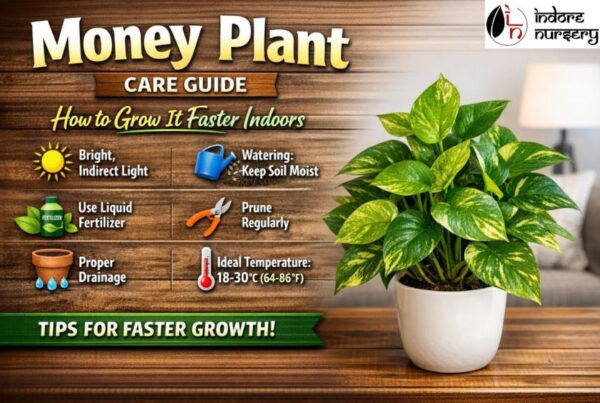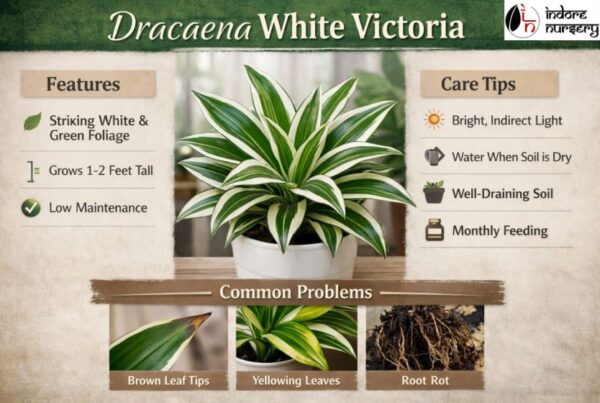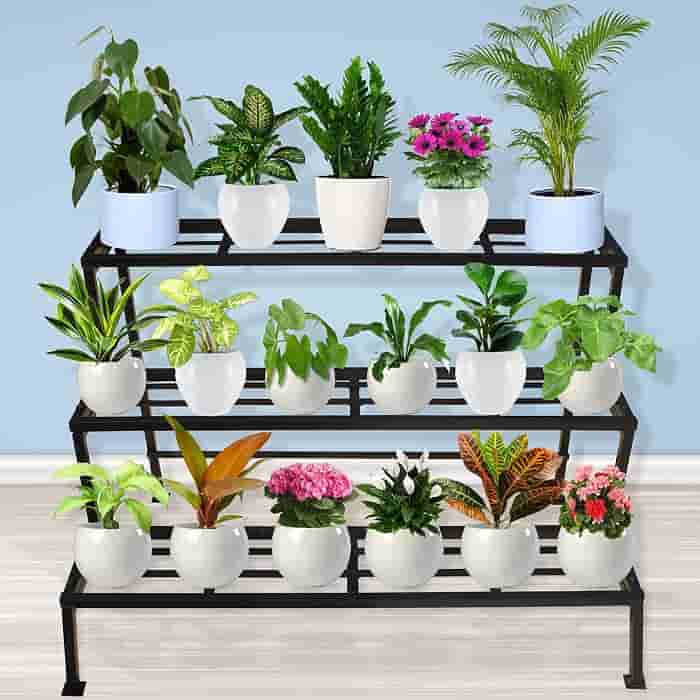Table of Contents
- Introduction
- Why indoor plants matter in 2025?
- How indoor plants purify the air?
- Top indoor plants for air purification
- Tips to maintain indoor plants
- Common mistakes to avoid with indoor plants
- Choosing the right plant nursery
- Conclusion
- FAQs
Introduction
Indoor air quality is now a major issue in 2025. With urban pollution on growth, inadequate ventilation in new homes, and a growing consciousness about respiratory welfare, more individuals are looking for ways to keep their living areas fresh. Indoor plants not only make your home great, but also clean the air by removing toxins, producing oxygen and regulating humidity.
Moreover, whether you buy plants from your local nursery or shop for indoor plants in Indore, it is important to choose species with famous air-purifies capabilities. In this blog, we will discuss top indoor plants for cleaner air, the way they work, and how to maintain them.
Why indoor plants matter in 2025?
Modern life has changed the course of indoor life. Synthetic materials, seal buildings and air conditioners live inside the house, such as carbon monoxide, formaldehyde and benzene. Therefore, these pollutants have adverse effects on people’s health for a long time, causing fatigue, allergies and respiratory issues.
Plants for these issues are a budget-friendly and environmentally friendly solution inside the house. They:
- Increase oxygen levels naturally.
- Low air dust and allergies.
- Regulate indoor humidity.
- Provide a comfortable environment that relieves stress.
Additionally, as people spend more time working from home, clean indoor air is necessary for families and professionals.
How indoor plants purify the air?
The indoor plant naturally cleanses the air through a process called phytoremediation. Leaves, stems, and indoor roots filter toxic gases and turn them into harmless products. However, microorganisms in the soil decompose toxins.
Some plants are particularly effective at:
- Elimination of volatile organic compounds (VOCs).
- Carbon dioxide balance.
- Adding humidity to avoid dryness.
Research, including NASA’s clean air studies, has indicated that some species effectively increase indoor air quality.
Top indoor plants for air purification
- Snake Plant (Sansevieria trifasciata)
- Known as “Mother-in-law’s Tongue.”
- Very low maintenance.
- Removes toxins such as benzene, xylene, and formaldehyde.
- Outputs oxygen in the evening, making it suitable for bedrooms.
- Areca Palm (Dypsis lutescens)
- Natural humidifier.
- Provides a touch of tropicality to interiors.
- Efficiently removes airborne toxins.
- Thrives in indirect sun.
- Spider Plant (Chlorophytum comosum)
- Easy to grow for beginners.
- Removes carbon monoxide and xylene.
- Grows beautifully in hanging baskets or pots.
- Pet and child-friendly.
- Peace Lily (Spathiphyllum)
- Stunning white flowers.
- Great at removing mold spores and VOCs indoors.
- Low maintenance in watering, but happy in shady areas.
- Rubber Plant (Ficus elastica)
- Recognizable by its large shiny leaves.
- Captures airborne chemicals well.
- Occasional trimming to keep it in check.
- Boston Fern (Nephrolepis exaltata)
- Excellent for replenishing moisture in dry rooms.
- Ideally suited for kitchens or bathrooms.
- Needs constant misting to remain healthy.
- Aloe Vera
- Two-way: Air purifier and natural remedy.
- Removes benzene and formaldehyde.
- Gel within leaves can be used to soothe minor burns.
Tips to maintain indoor plants
It is not difficult to keep the plants alive and to be rich, provided you follow some simple steps:
- Regular water but not overwater. Indoor plants usually do not like wet roots.
- Pottery with well corrugated soil. The root prevents rot and encourages healthy growth.
- Provide filtered sunlight. Excessive direct sunlight will burn the leaves.
- Clean the leaves regularly. The dust can prevent light from being absorbed.
- Fertilize during the growing season. Use soft plant food to guarantee nutrition.
However,if you are not convinced about plant care, you can get guidance from experts or get it from the best plant nursery in Indore. There professionals will be able to help you choose the appropriate varieties for your place.
Common mistakes to avoid with indoor plants
- Overwatering and root rot: Everyone overweight plants, assuming that they will grow rapidly. Excess water drowns the roots, which causes fungal growth and rot.
- Direct hard sunshine: Most home plants require filtered light. They are left scaled leaving directly in the sun and causing malaise and stunted growth.
- Lack of insect control: Even indoor plants carry spider particles or insects like aphids. Ignoring the insect test allows to increase infection, kill leaves and prevent health.
- Choosing a plant without considering your schedule: Selection of busy life and high maintenance is usually neglected. It is advisable to select low -care species that match your schedule.
Choosing the right plant nursery
A good nursery ensures that you get a healthy, disease -free plant with a good set of roots. If you are in a store or buying an online plant nursery in Indore , then see:
- Clear labeling of plant species.
- Details of care requirements.
- Plant goods such as utensils, fertilizers and soil are available.
Furthermore, when buying online, always check for reviews, shipping policy, and if they have after-sales services. A good nursery also recommends how to take care of plants, so your indoor gardening is stress free.
Conclusion
Indoor plants serve more than decorating your home—they cleanse the air naturally and benefit your health. With compact homes in 2025 and rising pollution, these plants have turned out to be a wise choice for fresher air. From low-maintainance snake plants to humidity-requiring boston ferns, there’s a plant to suit every home and lifestyle.
Additionally, healthy, full-colour plants don’t only brighten up spaces but clean the air of poisonous toxins. Buying from legitimate sources—be that your in-town nursery or legit suppliers offering online indoor plants in Indore—you get strong, long-lasting greens. Sitting indoor plants within your house is not just a matter of looks; it’s an inexpensive way of breathing in cleaner air and enjoying a calmer, healthier home on a daily basis.
FAQs
- What is the easiest indoor plant to care for?
The snake plant is low maintenance and thrives on neglect.
- How many indoor plants do I need for air purification?
NASA recommends at least one plant per 100 square feet for noticeable results
- Will indoor plants minimize dust at home?
Yes, plants trap air particles, minimize indoor dust levels.
- Do indoor plants need sunlight daily?
The majority of indoor plants like indirect light over direct sunlight.










Recent Comments